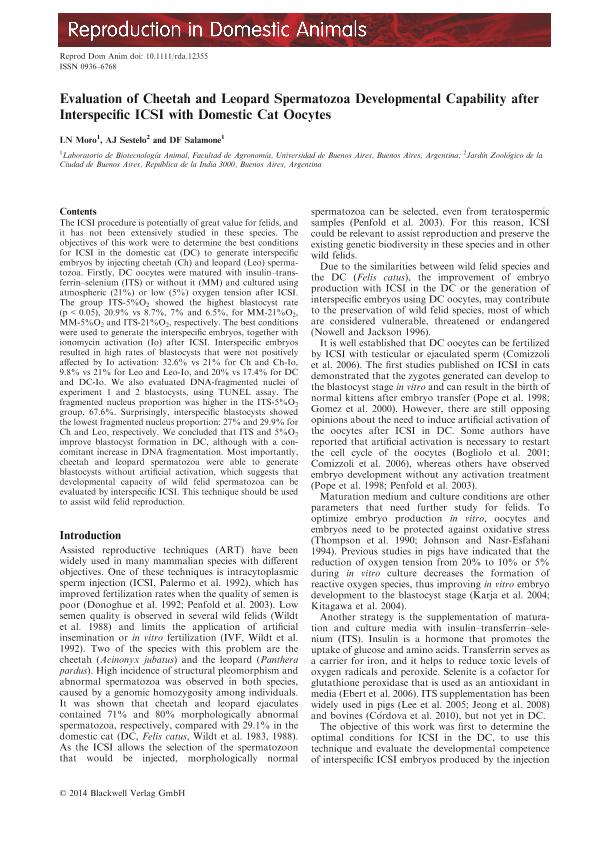Artículo
Evaluation of Cheetah and Leopard Spermatozoa Developmental Capability after Interspecific ICSI with Domestic Cat Oocytes
Fecha de publicación:
08/2014
Editorial:
Wiley Blackwell Publishing, Inc
Revista:
Reproduction In Domestic Animals
ISSN:
0936-6768
Idioma:
Inglés
Tipo de recurso:
Artículo publicado
Clasificación temática:
Resumen
The ICSI procedure is potentially of great value for felids, and it has not been extensively studied in these species. The objectives of this work were to determine the best conditions for ICSI in the domestic cat (DC) to generate interspecific embryos by injecting cheetah (Ch) and leopard (Leo) spermatozoa. Firstly, DC oocytes were matured with insulin–transferrin–selenium (ITS) or without it (MM) and cultured using atmospheric (21%) or low (5%) oxygen tension after ICSI. The group ITS-5%O2 showed the highest blastocyst rate (p < 0.05), 20.9% vs 8.7%, 7% and 6.5%, for MM-21%O2, MM-5%O2 and ITS-21%O2, respectively. The best conditions were used to generate the interspecific embryos, together with ionomycin activation (Io) after ICSI. Interspecific embryos resulted in high rates of blastocysts that were not positively affected by Io activation: 32.6% vs 21% for Ch and Ch-Io, 9.8% vs 21% for Leo and Leo-Io, and 20% vs 17.4% for DC and DC-Io. We also evaluated DNA-fragmented nuclei of experiment 1 and 2 blastocysts, using TUNEL assay. The fragmented nucleus proportion was higher in the ITS-5%O2 group, 67.6%. Surprisingly, interspecific blastocysts showed the lowest fragmented nucleus proportion: 27% and 29.9% for Ch and Leo, respectively. We concluded that ITS and 5%O2 improve blastocyst formation in DC, although with a concomitant increase in DNA fragmentation. Most importantly, cheetah and leopard spermatozoa were able to generate blastocysts without artificial activation, which suggests that developmental capacity of wild felid spermatozoa can be evaluated by interspecific ICSI. This technique should be used to assist wild felid reproduction.
Palabras clave:
Felids
,
Intracytoplasmic Sperm Injection
,
Low Oxygen
Archivos asociados
Licencia
Identificadores
Colecciones
Articulos(OCA PQUE. CENTENARIO)
Articulos de OFICINA DE COORDINACION ADMINISTRATIVA PQUE. CENTENARIO
Articulos de OFICINA DE COORDINACION ADMINISTRATIVA PQUE. CENTENARIO
Citación
Moro, Lucía Natalia; Sestelo, A. J.; Salamone, Daniel Felipe; Evaluation of Cheetah and Leopard Spermatozoa Developmental Capability after Interspecific ICSI with Domestic Cat Oocytes; Wiley Blackwell Publishing, Inc; Reproduction In Domestic Animals; 49; 4; 8-2014; 693-700
Compartir
Altmétricas




